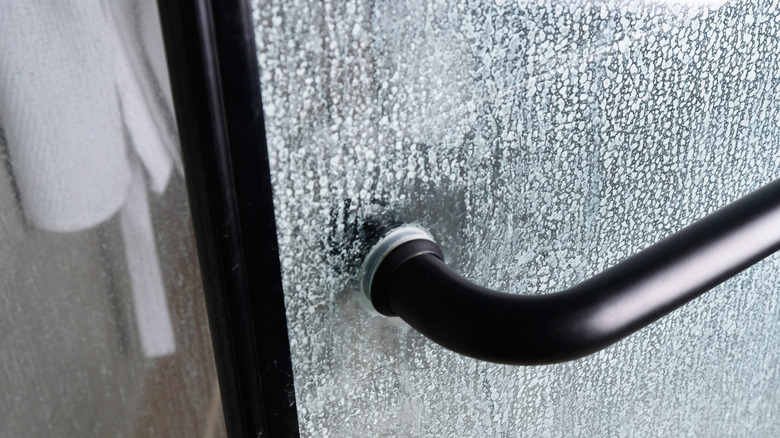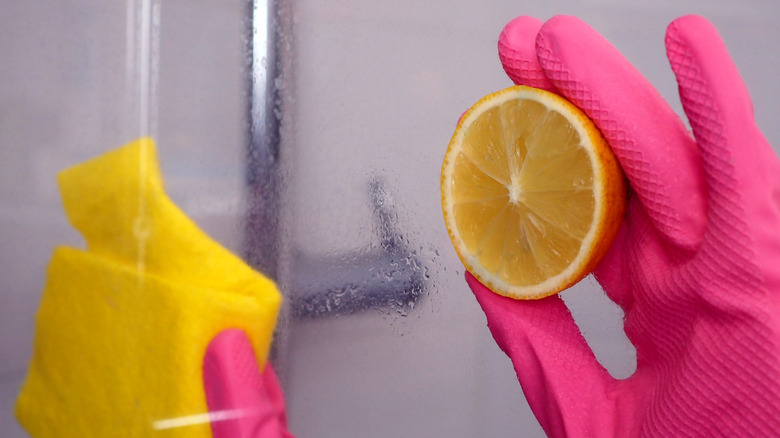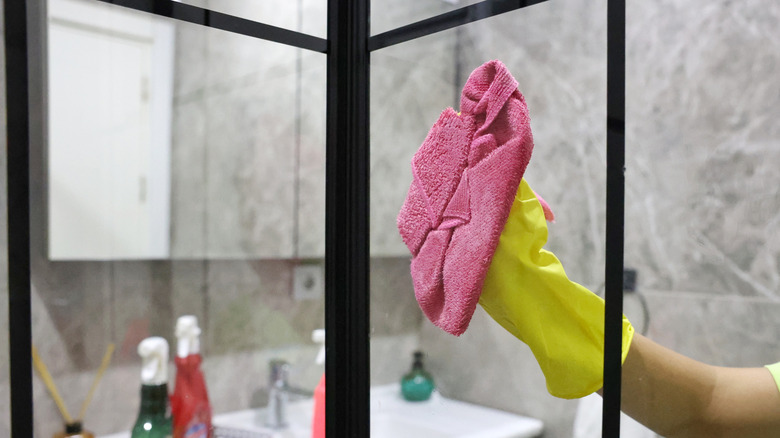The Common Kitchen Ingredient That'll Get Your Dirty Shower Doors Squeaky Clean
Glass shower doors look amazing in a chic, refined bathroom, but only when the doors are nice and clean. If you live in a home with hard water, then you probably know this all too well. Hard water is water that has over 60 milligrams per liter of calcium carbonate. The minerals in hard water can have a variety of effects on your plumbing, but one highly visible location you may first notice hard water is on your shower door. While there are many products designed to clean this area, there is also an all-natural DIY option that you likely already have in your kitchen: a lemon.
As you shower, water lands on the glass door and eventually dries up, leaving behind a calcium deposit that is also known as limescale. The build-up makes the glass look cloudy and spotty rather than fresh and clean, and the limescale can cause stains. If this sounds like your situation, then you might be wondering how a lemon can bring your shower doors back their sparkle. The basic idea of the hack is that the acidity of a lemon can break down the mineral deposits stuck on your shower door, making the residue easy to rinse and wipe away. If you want to try out this hack, there are a couple of different methods.
How a lemon can remove limescale from your shower doors
You will be happy to know that this hack is highly effective. The citric acid in lemons gives them a pH value of around 2.0, which is a good value for cleaning bathrooms. For especially tough mineral deposits, a cleaning solution with a pH value of 0 or 1 may be best, but for general bathroom cleaning and removing typical mineral deposits, a pH between 2 and 6 is effective. This puts lemons in a great spot for cleaning.
The first method for cleaning a glass shower door with a lemon uses the fruit in its purest form. All you need to do is cut the lemon in half and rub the inner fruit against the glass. Once you have wiped the whole door with the lemon, getting the acid on the limescale, allow it to sit for at least 5 minutes to give it time to break down the minerals. If the buildup was mild, you might be able to simply rinse away the residue. If not, you may need to scrub with an abrasive sponge. Alternatively, if you know the buildup is severe, you might have luck dipping the lemon in salt before rubbing it on the door for the scrubbing effect. Although lemons may seem harmless, it is a good idea to wear gloves and protective eyewear during this cleaning process for protection from the acid.
Keeping your shower door in prime condition
Instead of rubbing your entire shower door with a piece of lemon, you can try just using the juice. For this method, you need an empty, clean spray bottle and some lemons. Juice the lemons and pour the contents into a spray bottle. Then, spray it onto your glass and wait for a few minutes before rinsing away the residue. If you do not want to spend all of your time juicing lemons, you can try using store-bought bottled lemon juice or mixing equal parts lemon juice and distilled white vinegar.
For hardware and handles on your shower door that are experiencing buildup, lemon can also be effective. Rubbing the lemon should be about as effective on hardware as on the glass, but a sprayed solution will drip off. Instead, soak a cloth or paper towel in lemon juice and wrap it around any handles or hardware to ensure that the lemon juice gets enough contact with the mineral deposits before rinsing.
Once the limescale is removed, your shower door should look much nicer. If you choose to follow the lemon treatment with a regular cleaning, make sure you know all about the mistakes you have to stop making when cleaning glass shower doors so that your doors end up shiny and free of streaks. Be sure to repeat the process regularly to prevent buildups and make future cleanings much easier. You can also look into the simplest solution for preventing hard water buildup in your home for more information on dealing with hard water.


